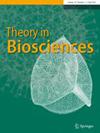假设:核相关蛋白与亲本DNA链分离产生一致的表型多样性。
IF 1.3
4区 生物学
Q3 BIOLOGY
引用次数: 2
摘要
在细菌种群中产生一致的表型多样性是一个基本问题。我们在此提出,某些核相关蛋白或nap的DNA链特异性分离导致这些蛋白不对称地分布到子细胞。我们援引了多种机制来解释这种不对称分离,包括基于前导链和滞后链之间差异的机制、翻译后修饰、寡聚化和与膜结构域的关联。本文章由计算机程序翻译,如有差异,请以英文原文为准。
Hypothesis: nucleoid-associated proteins segregate with a parental DNA strand to generate coherent phenotypic diversity.
The generation of a phenotypic diversity that is coherent across a bacterial population is a fundamental problem. We propose here that the DNA strand-specific segregation of certain nucleoid-associated proteins or NAPs results in these proteins being asymmetrically distributed to the daughter cells. We invoke a variety of mechanisms as responsible for this asymmetrical segregation including those based on differences between the leading and lagging strands, post-translational modifications, oligomerisation and association with membrane domains.
求助全文
通过发布文献求助,成功后即可免费获取论文全文。
去求助
来源期刊

Theory in Biosciences
生物-生物学
CiteScore
2.70
自引率
9.10%
发文量
21
审稿时长
3 months
期刊介绍:
Theory in Biosciences focuses on new concepts in theoretical biology. It also includes analytical and modelling approaches as well as philosophical and historical issues. Central topics are:
Artificial Life;
Bioinformatics with a focus on novel methods, phenomena, and interpretations;
Bioinspired Modeling;
Complexity, Robustness, and Resilience;
Embodied Cognition;
Evolutionary Biology;
Evo-Devo;
Game Theoretic Modeling;
Genetics;
History of Biology;
Language Evolution;
Mathematical Biology;
Origin of Life;
Philosophy of Biology;
Population Biology;
Systems Biology;
Theoretical Ecology;
Theoretical Molecular Biology;
Theoretical Neuroscience & Cognition.
 求助内容:
求助内容: 应助结果提醒方式:
应助结果提醒方式:


